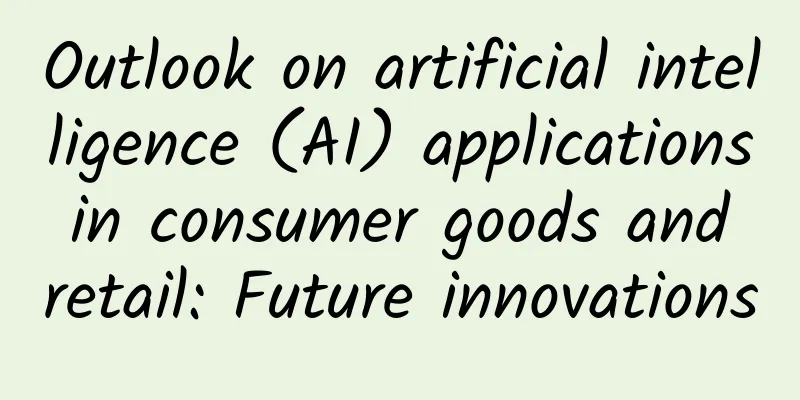Outlook on artificial intelligence (AI) applications in consumer goods and retail: Future innovations

|
introduction In the digital age, the development of artificial intelligence is in the ascendant and continues to deeply penetrate all walks of life, including consumer goods and retail. Artificial intelligence technology has not only brought huge opportunities to enterprises, but also brought disruptive changes and unprecedented challenges, widely involving business capability transformation, process optimization and decision-making model upgrades . In a market environment with fierce competition and evolving consumer behavior, consumer goods companies must maintain a keen sense of smell and open awareness to face the future impact driven by AI and seize the potential opportunities behind the future wave in advance . Roland Berger believes that the key to success in learning, adapting, embracing and even mastering this trend is: AI research will be a top priority for CXOs, a new source of innovation for enterprises, and a key "liberal management/free skills" for business executives in the future. Recently, Roland Berger conducted in-depth analysis of cases on how more than 60 consumer goods and retail companies in China and around the world prioritized the use of AI to drive business development in nearly 30 segmented scenarios, and explored the potential value contribution of AI in brand innovation, marketing, and sales efficiency improvement. As a breakthrough technology, the booming artificial intelligence (AI) is changing the consumer goods and retail industries at an astonishing speed. Fierce business competition requires companies to constantly adapt to new technologies and changing market demands. The time to think and act has come. Companies need to remain agile and be ready to embrace the future wave driven by artificial intelligence: only by flexibly responding to technological changes and market dynamics can companies remain invincible in the competition and achieve continuous innovation and growth. How will artificial intelligence drive the future? Data science, artificial intelligence, machine learning... History has witnessed the rapid development of a series of emerging technologies in the field of computer science. Since Google launched the Transformer model in 2017, LLM (Large Language Model) has gradually penetrated into daily life scenarios. By the end of 2022, ChatGPT was born. As soon as it was launched, it exploded in the market due to its powerful usage effect and broad imagination space, attracting 100 million users in just two months. ChatGPT, or Chat Generative Pre-trained Transformer, is an AI chatbot created by OpenAI that allows users to guide the chatbot to perfect their answers in the desired length, format, style, level of detail, and language used in the conversation, and considers successive prompts and replies as context at every stage of the conversation. Although ChatGPT is just a drop in the ocean of emerging technologies, it has become a real game changer. ChatGPT contains a vast amount of knowledge, but it is not magic, just pure mathematics applied to data. It is a probabilistic model that has been trained to generate the "best" response from training data. GPT has many powerful functions, such as research and data analysis, program generation, text generation, content creation, general reasoning, etc., which can greatly improve production efficiency in different business fields. As a leading language model, it copes with various tasks with excellent intelligence capabilities and promotes business innovation and development. ChatGPT is leading the change of the rules of the game, but we are only at the beginning of our understanding of it. ChatGPT has a wide range of advantages but also has certain application limitations. In view of these limitations, enterprises can take a series of measures to mitigate their impact. • Advantages of ChatGPT - Good intuition, almost reaching human simulation – Knowledgeable – Wide range of uses and strong versatility – Self-improvement – Wide range of tasks that can be handled • Limitations of ChatGPT – False information/ “making up facts” – Information is not immediate – Potential plagiarism – Privacy and data security issues – Highly susceptible to malicious input – Poor information traceability • Possible mitigation measures – Tune your own models to enable them to handle more complex tasks and improve the accuracy of results and content – Create your own data/IP management layer to determine data ownership and achieve customization Continuous research and practice will help enterprises maximize the potential of artificial intelligence technology and stay ahead in the fierce competition. Artificial intelligence can help enterprises focus more on immediate efficiency and achieve full integration and overall efficiency improvement in the long term. How does artificial intelligence empower consumer goods and retail operations? After a preliminary understanding of the development and conceptual framework of ChatGPT, the question is what does it mean for CXOs and business executives of consumer goods companies? Let's focus on the consumer goods and retail sectors to take a look. Recently, Roland Berger conducted an in-depth analysis of the cases of global and local leading consumer goods and retail companies that have tried and embraced this technology, and extracted four operating models based on the level of internal automation in R&D, marketing and sales processes and the degree of automation in consumer-facing interfaces: Fully automated: The entire process of product production and sales is data-driven, with a high level of personalization of products and marketing User-driven: The company has not yet widely used digital operations, but emphasizes multi-channel and personalized customer interaction Efficiency gains: The internal business processes of enterprises are highly automated, but less emphasis is placed on interaction with customers/users. · Traditional dependence: The main business relies more on manual processes, and its influence mainly relies on the deep cultivation and operation of traditional retail channels At the same time, we must emphasize that while enterprises are pursuing the improvement of automation level, optimizing customer experience is also crucial, and both need to be promoted together. Roland Berger analyzed the practices of different enterprises and found that enterprises can achieve better return on investment in the process of changing from cost-oriented to customer/user experience-oriented. At present, many brands may fall into the cost trap or fall behind brands that focus more on customer experience, which are creating industry-leading benchmarks. Companies that are cost-centric "Product Creator" can gradually transform into quality-centric "Experience King (Touchpoint Optimizer)" , and finally become "Customer Delight Champion" centered on customer/user experience. In this process, companies can achieve a comprehensive win-win situation of ROI and customer experience. How does artificial intelligence stimulate the vitality of the value chain? In the field of consumer goods and retail, artificial intelligence/ChatGPT can be used in all aspects of the life cycle from R&D, production, management to marketing and sales. In this article, we will focus on its application in R&D, marketing and sales. Expanding the corresponding consumer goods/retail enterprises' main value chain, AI can drive the efficiency and efficacy of enterprises at different stages in the entire spectrum. Roland Berger conducted a detailed analysis of nearly 30 segmented scenario use cases at different stages of the value chain, gained insights into industry-leading practices, and extracted the core capabilities and potential AI-enabled scenarios that consumer goods and retail enterprises need to master in the AI-driven future. In addition, Roland Berger analyzed the potential impact of artificial intelligence in the entire product life cycle process and confirmed that companies can benefit from using artificial intelligence in many areas. For example, using artificial intelligence in marketing can increase click-through rates by 223% and conversion rates by 500%. In the future, enterprises will face major trends in creative content, media diversity, digital transformation and changes in channel models. At the same time, they will need to conduct end-to-end integration to improve overall operational efficiency through automation, high personalization and dynamic transparency. The changes triggered by these trends also provide brands with unprecedented opportunities for improvement. Brands need to seize opportunities, accumulate strength in advance and embrace changes, including: • Evaluate AI-driven end-to-end automation opportunities to improve overall efficiency of consumer-facing interfaces • Clarify the enabling scenarios and cross-cutting business processes involved in AI, and strive to reduce the complexity of overall operations • Benchmark and improve technology deployment (including concept change, human resources reserve and organizational transformation) to achieve intelligence and automation to the greatest extent Roland Berger will assist brands in considering the most influential concerns in the future, and inspire consumer goods and retail companies to accelerate the potential of applying artificial intelligence. Starting from the current organization, products, and technologies, we will conduct impact analysis and diagnosis, further formulate artificial intelligence strategies and implementation plans, and ultimately realize the brand's artificial intelligence concept sorting and large-scale empowerment. The key to success in learning, adapting, embracing, and even mastering this trend is: AI research will be a top priority for CXOs, a new source of innovation for enterprises, and a key "liberal art" for business executives in the future (quoting management guru Peter Drucker's concept of "liberal art"). Finally, we believe that Roland Berger’s research in the field of artificial intelligence is only a preliminary exploration. In the future, it will need to work with consumer goods and retail companies to meet the many challenges of an AI-driven future, return to the origins of business capability building and corporate competition, and jointly meet opportunities and challenges. We look forward to working with consumer goods and retail companies to integrate their core genes and capabilities, jointly build differentiated business strategies, and form a stable business capability model to cope with the dynamic and changing market and consumer needs. Compared with traditional "preaching" top-level consulting, we will participate more deeply in the internal co-creation and collaboration of the company, jointly create methodologies and implement best practice cases, and truly achieve synergy at the first scene! From: Roland Berger Management Consulting |
<<: Sexy photos will make you look silly
>>: iOS reveals multiple secret backdoors, users are monitored every minute
Recommend
Why did a woman and her whole family use their feet to press the elevator button? What does the whistleblower say?
Do you have such a neighbor? #Woman presses the b...
Analysis of Himalaya user operation strategy!
Himalaya has carved out a niche in the audio and ...
SEO order-taking platform, what is the order-taking process for SEO outsourcing services?
Many people who are good at SEO like to provide S...
A small gadget that can relieve stress at a low cost. I really recommend you to try it!
Aromatherapy candles, a craft that combines light...
Chevrolet electric cars with long range and low price debut at Los Angeles Auto Show
At this year's Los Angeles Auto Show, many ma...
Let’s talk about how to operate from the perspective of channel operation
I felt sleepy in the afternoon and wanted to go d...
A thin layer is warmer than down? Is aerogel cold-resistant clothing a waste of money?
Winter is here, the temperature has dropped sharp...
What’s so magical about “orange peel” that is better off dried than fresh?
At the beginning of this year, the TV series &quo...
Activity promotion: Let’s talk about how to draw lucky draws to attract new customers
The event lottery mini program is probably no str...
How difficult is it to make a ballpoint pen? Your childhood schoolbag actually contained high-tech
Produced by: Science Popularization China Produce...
APP Promotion Activities: How to plan a screen-sweeping event?
Wang Zaixing, co-founder of New World, said in an...
Lenovo S5 Pro: A thousand-yuan phone that subverts old values, with AI quad-cameras that take "idol-level selfies" to a new level
On October 18, Lenovo officially released its new...
Chengdu Tea Tasting Studio, the best place to experience tea tasting [Recommended]
Chengdu Tea Tasting Studio: Senior agent Night Vi...
Why do some phones charge faster?
The charging process of a smartphone is mainly com...
Every smooth day, they are protecting you
Mixed Knowledge Specially designed to cure confus...









